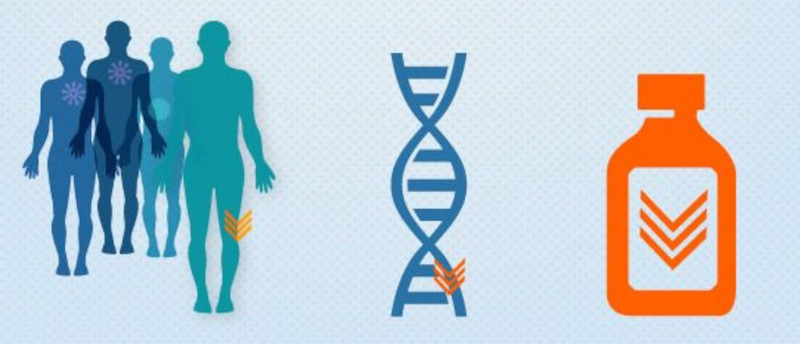Press Release: 12 open arms in NCI-MATCH treatment trial await patients with advanced or rare cancers

A new study arm opens, expanding patients’ potential to qualify for the trial when they may not have other options. The available treatments target tumor defects with drugs that show efficacy evidence. Testing labs continue to identify trial candidates.
Philadelphia, April 26, 2021 — The NCI-Molecular Analysis for Therapy Choice (NCI-MATCH) cancer clinical trial is expanding with the opening of a new treatment arm. The addition, Arm Z1M, is a single-arm phase II study of a two-drug combination, relatlimab and nivolumab, both immunotherapies. To be eligible, patients must have mismatch repair deficiency on genomic testing and tumors that express the LAG-3 protein, a cancer immunotherapy target. The cancer must also have progressed on anti-PD-1/PD-L1 immunotherapy. The addition brings the number of available treatment arms in NCI-MATCH to 12. The ECOG-ACRIN Cancer Research Group (ECOG-ACRIN) and the National Cancer Institute (NCI), part of the National Institutes of Health, are co-leading the trial, which is being conducted in the NCI National Clinical Trials Network.
 “The trial is ongoing and continuing to provide critical information on possible cancer therapies,” said Peter J. O’Dwyer, MD, ECOG-ACRIN Group Co-Chair, who also co-leads the NCI-MATCH trial. “Each arm — and every patient who participates — is contributing valuable information on responsive versus unresponsive cancer types, especially in rare cancers where there are little or no data available.”
“The trial is ongoing and continuing to provide critical information on possible cancer therapies,” said Peter J. O’Dwyer, MD, ECOG-ACRIN Group Co-Chair, who also co-leads the NCI-MATCH trial. “Each arm — and every patient who participates — is contributing valuable information on responsive versus unresponsive cancer types, especially in rare cancers where there are little or no data available.”
The largest precision medicine cancer clinical trial to date is NCI-MATCH with 39 single-arm phase II treatment arms. Researchers are locating patients for the 12 remaining arms as results are published or being analyzed for the other arms.
NCI-MATCH enrolls patients with any type of advanced solid tumor, lymphoma, or myeloma that has progressed on standard treatment, or patients with rare types of cancer for which there is no standard treatment.
“With the addition of Z1M, the open arms in NCI-MATCH address a range of 12 unique molecular targets and corresponding drugs that have evidence they work against that target,” said Dr. O’Dwyer.
LAG-3 is a checkpoint inhibitor pathway. Relatlimab is a LAG-3–blocking antibody that binds to LAG-3 on T cells, restoring effector function of exhausted T cells. LAG-3 assessment is based on protein expression, measured by immunohistochemistry (IHC).
The 12 open arms and molecular targets (drugs in parentheses) are as listed below:
- BRAF V600E or BRAF V600K mutations (dabrafenib and trametinib)
- CDK4 or CDK6 amplification (palbociclib)
- cKIT mutations (sunitinib malate)
- EGFR mutations (afatinib)
- EGFR T790M (AZD9291)
- LAG-3 expression and dMMR status (relatlimab and nivolumab)
- MET amplification (crizotinib)
- MET exon 14 deletion (crizotinib)
- mTOR mutations (TAK-228)
- NTRK fusions (larotrectinib)
- PTEN loss without PIK3CA mutations (copanlisib)
- TSC1 or TSC2 mutations (TAK-228)
 “NCI-MATCH bases trial eligibility on molecular characteristics instead of organ site, allowing the inclusion of people who previously could not get access to agents that target these tumor abnormalities,” said Lyndsay Harris, MD, Translational Co-chair of NCI-MATCH and Associate Director of the Cancer Diagnosis Program, Division of Cancer Treatment and Diagnosis, NCI.
“NCI-MATCH bases trial eligibility on molecular characteristics instead of organ site, allowing the inclusion of people who previously could not get access to agents that target these tumor abnormalities,” said Lyndsay Harris, MD, Translational Co-chair of NCI-MATCH and Associate Director of the Cancer Diagnosis Program, Division of Cancer Treatment and Diagnosis, NCI.
Tumor testing by an NCI-designated lab is the only pathway for patients at participating sites to enroll in the trial. Physicians and staff at participating trial sites order standard tumor tests from one or more of the 11 participating commercial testing laboratories to guide their patients’ clinical care. The labs flag test results as potential trial candidates and notify the oncologist when patients’ tests reveal aberrations included in the NCI-MATCH trial.
Commercial laboratories are as follows:
- Foundation Medicine, Inc.
- Strata Oncology, Inc.
- Caris Life Sciences®
- Tempus Labs, Inc.
- Ashion Analytics, LLC
- CellNetix Pathology and Laboratories
- GenPath (BioReference Laboratories, Inc.)
- NeoGenomics Laboratories, Inc.
- Quest Diagnostics Inc.
- The Jackson Laboratory
“The referral process is working very well – so far, the labs have identified nearly 700 trial candidates,” said Dr. O’Dwyer. “The labs are reviewing thousands of patient tests every month, casting a wide net for potential patients.”
Molecular testing for cancer treatment selection is a common practice. Medicare and most insurance companies cover it.
The NCI-designated lab network includes not only 11 commercial labs but also 17 academic labs, which generally test their own patient populations.
“NCI-MATCH is the only trial to build an extensive network of testing laboratories—necessary to find patients for a study where molecular features determine eligibility,” said Dr. Harris. “Unlike other studies that evaluate the use of next-generation sequencing, NCI-MATCH is investigating both approved and experimental drugs broadly across cancer types and beyond what we currently know about these molecular targets.”
Generally, each treatment arm aims to enroll 35 patients. However, four of the 12 current arms have additional slots ready and available, knowing that the labs will identify more potential candidates for these arms than those with less prevalent targets. The four expansion arms are targeting BRAF V600E or BRAF V600K mutations, CDK4 or CDK6 amplification, MET amplification, and TSC1 or TSC2 mutations.
A promising efficacy signal is also the reason for expanding Arm H. This arm investigates the selective BRAF inhibitor dabrafenib and the MEK1/2 inhibitor trametinib in patients whose tumors harbor BRAF V600E or BRAF V600K mutations. The initial cohort met its primary endpoint, with an objective response rate of 38% (P < .0001) in a mixed histology, pretreated cohort of 29 evaluable patients (Salama AKS. J Clin Oncol. 2020 August 06).
“We hope to identify 50 more patients for Arm H to better define the broad applicability of the recently-published positive findings in the initial cohort,” said Dr. O’Dwyer.
Nearly 1100 cancer centers and community hospitals are participating in NCI-MATCH. There are sites in every US state, the District of Columbia, and Puerto Rico, and trial leaders encourage more clinical sites to open the trial.
###
